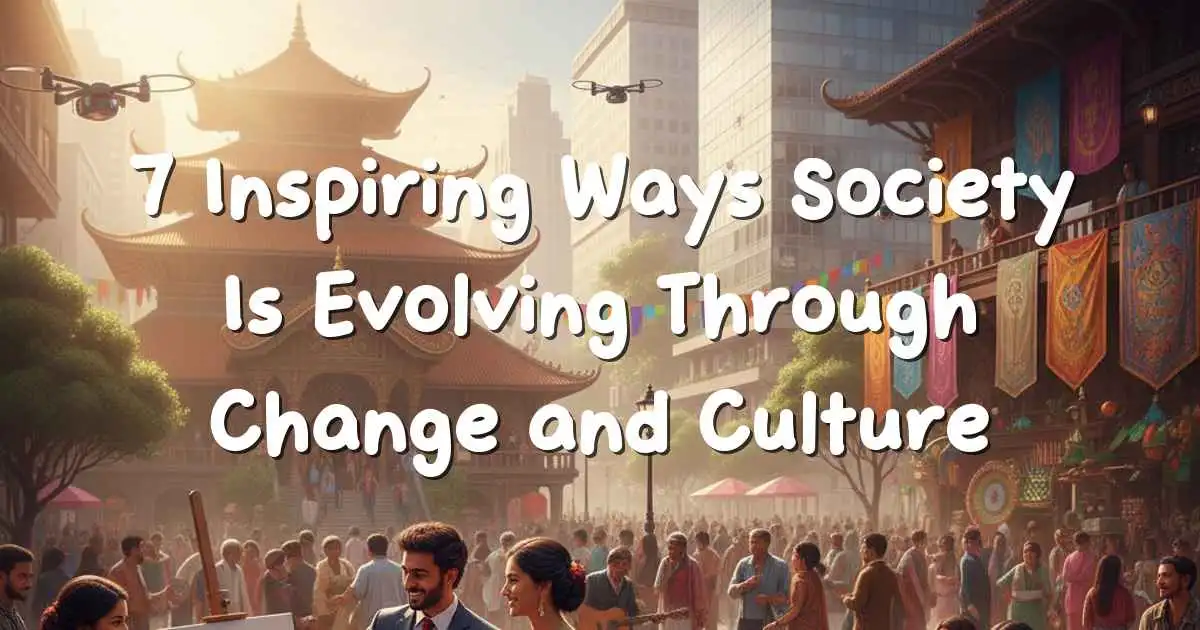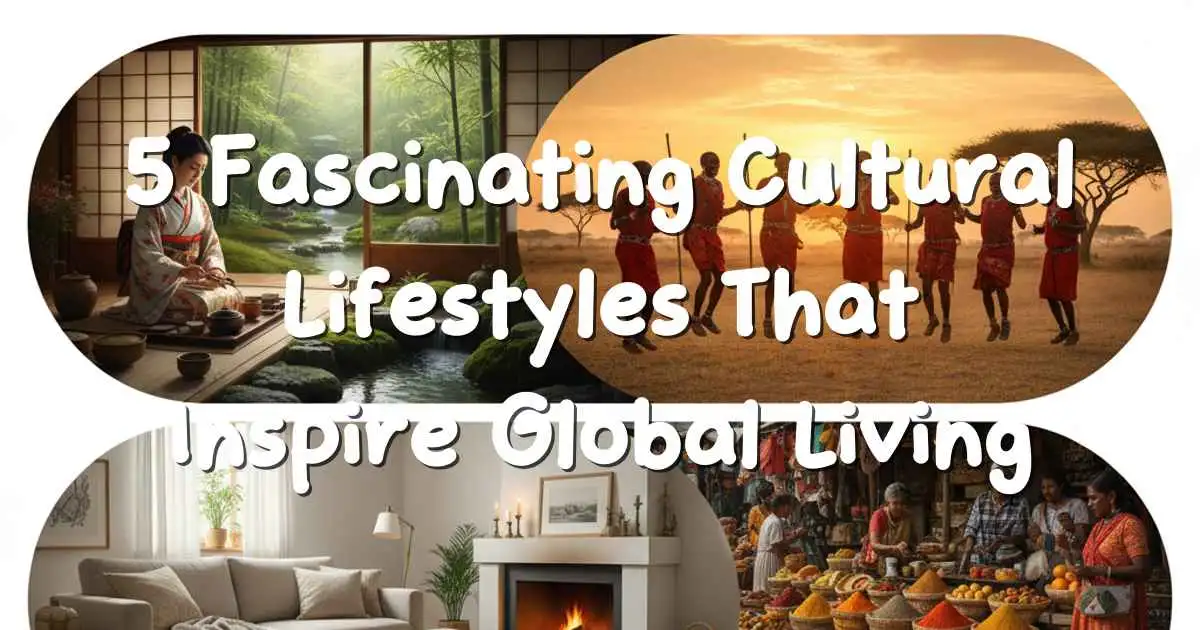Introduction
Change is the only constant and nowhere is this truer than when we look at how societies evolve through culture, technology, and human connection. From local neighbourhoods to global networks, communities are reshaping themselves in response to shifting values, new tools and emerging generations. In this article we’ll explore seven inspiring ways society is evolving through change and culture: how communities adapt, what drives the transformation, and why it matters for all of us who care about lifestyle, travel, inspiration and the human story.
1. Embracing Diversity as a Cultural Asset
One of the most visible Changes in modern society is the growing recognition that diversity is not just a checkbox it’s a strength. Whether through global migration, inter-cultural exchange or digital communication, communities are weaving multiple cultural threads into their daily life. This shift means festivals, food, art, languages and belief-systems are more interlaced than ever before.
When society sees cultural difference as creative fuel instead of friction, new ideas bloom. Cities host multicultural parades that draw visitors from around the world, local businesses adopt multilingual signage, and travel experiences become deeply immersive. For the individual traveller or lifestyle-seeker, this means richer texture and connection.
Key takeaway: Recognising cultural diversity invites innovation, opens minds and helps societies evolve in resilient ways.
2. Technology-Driven Social Transformation
Culture and society have always evolved alongside tools. Today’s rapid change is driven by digital connectivity, social platforms and data-driven insights. Communities no longer need to wait decades to transform; now shifts may happen within months.
For example, a small town might go from no broadband to full-fibre connectivity, enabling remote entrepreneurship, global education access and virtual cultural exchange. That kind of transformation reshapes economy, mindset and social norms.
When we speak of “society evolving through change,” the technology piece is vital: social networks create new forms of gathering, digital platforms support community building, and cultural expression becomes instantly global.
Key takeaway: Technology acts as an accelerator for social and cultural evolution enabling societies to leap rather than crawl.
3. Grassroots Movements and Cultural Renewal
Real change often arises from the grassroots: community initiatives, local art collectives and citizen-led campaigns. These movements pivot culture and society from the bottom up. Whether it’s a neighbourhood urban-garden project, a street-art mural festival, or a local heritage preservation effort, these actions have ripple effects.
Such initiatives adopt cultural shifts: new values around sustainability, community sharing, inclusive governance and creative identity. They reshape social norms and help societies evolve by challenging old habits and inviting fresh ones.
For the lifestyle-curious traveller or observer, this means you’ll discover hidden gems: local cooperatives, storytelling circles, and culture-labs that energise society’s next chapter.
Key takeaway: Grassroots cultural renewal shows that societal change doesn’t always come from big institutions it can begin at street-level.
4. Cultural Tourism and Travel as Agents of Change
When you travel, you become part of societal evolution. Cultural tourism is evolving from passive sightseeing to immersive social experience. Visitors stay longer, engage in local communities, learn heritage crafts and participate in culture exchange. This transformation helps societies evolve by turning visitors into collaborators.
On the flip side, host societies adapt to welcome meaningful involvement: local food traditions get revived, historic districts get revitalised, and new hybrid cultural practices emerge. Travel becomes a conduit for change rather than just consumption.
Key takeaway: Society evolves when cultural exchange and travel become purposeful helping local communities grow while guests meaningfully contribute.
5. Inclusive Culture and Social Equity
Society evolving through culture means building inclusive models where access, voice and representation matter. More and more communities are designing cultural institutions (museums, galleries, public spaces) to be inclusive not just with token gestures, but through structural change. When all voices are heard, culture becomes richer and society evolves more equitably.
Examples include bilingual signage, inclusive public art projects, accessible design in heritage sites, and cultural festivals that deliberately spotlight under-represented groups. For a global reader, this means the world is shifting towards cultural equity and shared benefit.
Key takeaway: Inclusive culture lifts up society, enabling growth that is shared, sustainable and humane.
6. Adapting Traditions in a Changing World
Tradition and modernity are no longer enemies; instead many societies are blending them creatively. Communities are reinterpreting age-old traditions through new lenses: festivals use digital projections, traditional ceremonies incorporate sustainability, and local crafts merge with tech design. This blending helps societies evolve by maintaining continuity while innovating.
For instance, a village may celebrate harvest season but use eco-friendly materials for decorations, livestream the event globally and invite virtual participation. Such hybrid traditions keep culture alive, relevant and dynamic.
Key takeaway: Societal evolution thrives when tradition adapts, rather than disappears.
7. Sustainability and Cultural Resilience
Finally, society evolving through change and culture is closely linked to sustainability: ecological, economic and cultural resilience. Communities are learning that culture matters for survival: heritage landscapes, local foods, indigenous knowledge, arts practices all build resilience. When societies embed sustainability into their culture, they evolve proactively rather than reactively.
From community solar projects to zero-waste festivals, culture and sustainability walk hand-in-hand. For travellers and lifestyle seekers, this means you’ll witness new cultural ecosystems where green design, community gardens and regenerative practices are part of the cultural fabric.
Key takeaway: Cultural sustainability feeds social transformation society evolves when it honours the past, lives in the present and protects the future.
How-To: Embrace Cultural Evolution in Your Own Life
Here are simple steps you can take to engage with and benefit from the evolving society around you:
-
- Stay curious and open-minded. Attend cultural festivals, try local cuisine, learn a few phrases in a new language.
- Engage actively in communities. Volunteer for local cultural projects, join community workshops, connect with grassroots initiatives when travelling.
- Support sustainable culture. Choose tours and experiences that prioritise local wellbeing, buy local crafts, engage with culture respectfully.
Frequently Asked Questions (FAQ)
Q: What does “society evolving through culture” actually mean?
A: It refers to how communities grow, adapt and transform by embracing cultural shifts new values, technologies, traditions and shared practices.
Q: How does travel contribute to cultural evolution?
A: Travel fosters exchange. When visitors engage meaningfully, they become part of the cultural ecosystem, helping host societies adapt and grow.
Q: Can traditions survive in a fast-changing world?
A: Yes in fact many traditions evolve. By integrating modern tools and values with heritage, communities keep traditions alive and dynamic.
Q: Why is an inclusive culture important for social transformation?
A: Inclusive culture ensures diverse voices are heard, richness is created and society evolves in a fair, resilient way rather than leaving some behind.
Q: How can I experience this sort of cultural evolution as a lifestyle traveler?
A: Look for immersive community‐led experiences, stay awhile, talk with locals, and participate in cultural work rather than just observe.
Conclusion
Societies all over the world are evolving not because change is forced, but because communities are choosing to adapt and grow through culture, connection and creativity. Whether you’re travelling, living locally, or just seeking inspiration, the story of cultural evolution invites you in. Share your favourite way of witnessing culture change in your community (or on your travels) in the comments below your insight might just inspire someone else’s journey!
Related article: 10 Promising Career Opportunities Shaping the Future Workforce




